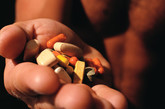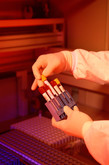Generics
Profits for generics’ giant Teva soar
Israel-based generics’ giant Teva Pharmaceutical Industries has reported a third quarter 2010 profit rise of 47%, mainly attributed to sales of its multiple sclerosis drug Copaxone (glatiramer acetate), its acquisition of Ratiopharm and generic launches in the US.
The generic drug wars: deeply discounted medication
Fierce competition among major pharmacy chains in the US, such as CVS, Walgreens and Walmart, has led to a generic prescription pricing war with unclear public health implications.
Ranbaxy gets 180-day exclusivity for Alzheimer’s generic
On 30 November 2010, generics’ giant and India’s largest pharmaceutical manufacturer, Ranbaxy Laboratories, announced the launch of a generic version of Pfizer’s blockbuster Alzheimer’s treatment, Aricept (donepezil hydrochloride), in the US.
The clinical equivalence of brand-name beta-blockers and their generic counterparts
The healthcare systems of the world are all under pressure to reduce costs and using generic substitution for the initially prescribed, more expensive equivalents is an obvious area to investigate. However, as a report reiterated in 2010, treatment decisions should not be based on economic grounds alone, for this would not be in the patient's best interest and would therefore be unethical. What is needed is an opinion based on the evidence available regarding therapeutic equivalence [1].
Are generic diuretics clinically equivalent to their brand-name counterparts for the management of cardiovascular disease?
Prescription costs are rising, mainly due to brand-name drugs recouping their investment during the period of patent protection and market exclusivity. For this reason, many payers and prescribers encourage use of the cheaper generic versions [1]. This has been found to have another positive consequence, namely the increased accessibility to prescription treatments and an increased compliance with drug regimens, particularly in the case of chronic conditions [2, 3].
Sun gains tentative approval for generic Crestor
Indian-based Sun Pharmaceutical Industries announced on 29 September 2010 that the FDA had granted its subsidiary a tentative approval for its Abbreviated New Drug Application (ANDA) to market a generic version of IPR Pharmaceuticals’ (a part of AstraZeneca) anti-cholesterol drug Crestor (rosuvastatin calcium).
Generic or brand-name drugs for cardiovascular disease? Does the evidence match current opinion?
Cardiovascular drugs constitute a large proportion of outpatient prescription drug spending.
The rise in power of generic drugs
With shrinking pipelines, the impending expiration of many drug patents, and the global economic downturn experienced in the last two years causing prescription payers to face budget cuts, generic drugs are becoming an increasingly large player in the economics of the global pharmaceutical industry.
WHO prequalification programme for APIs
The WHO initiated on 21 October 2010 a pilot prequalification programme for selected active pharmaceutical ingredients (APIs) used in drugs for HIV and related diseases, antimalaria and anti-tuberculosis medications.
FDA considering tighter controls on generics
The FDA may tighten standards for how closely generic drugs resemble brand-name equivalents. This comes as a result of complaints from both patients and employees of generic drugmakers that some of the medicines do not work as well as the originals.













